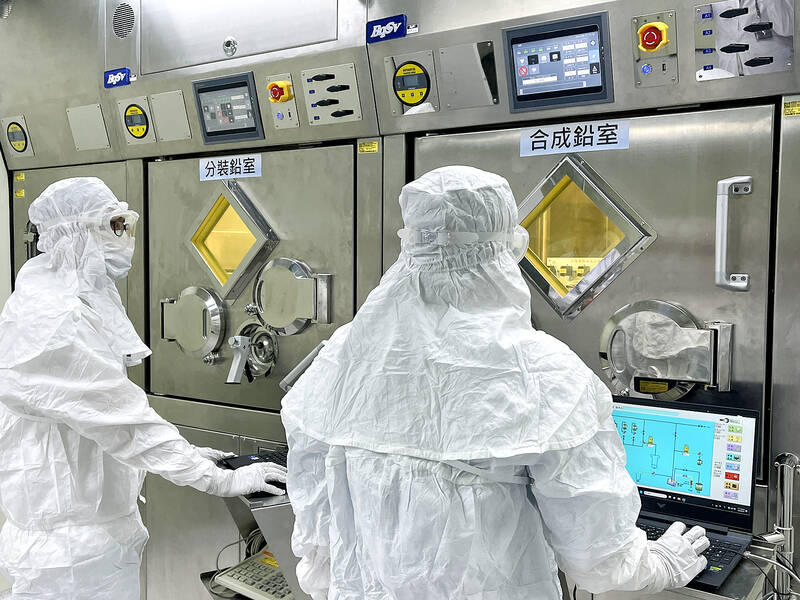The National Atomic Research Institute (NARI) is preparing to install a 70 million electron volts (MeV) cyclotron to produce short-half-life radiopharmaceuticals, which would stabilize the domestic supply of medical isotopes.
The machine is scheduled to be completed in 2026 and begin producing radiopharmaceuticals in 2027, the institute said yesterday.
Taiwan has to import most of its short-half-life radiopharmaceuticals from other countries, NARI vice president Wang Jeng-jong (王正忠) said.

Photo: Chen Chia-yi, Taipei Times
As radiopharmaceuticals cannot be stored in large amounts due to their short half-life, the country experienced a shortage of the drugs during the COVID-19 pandemic, Wang said.
The institute could in the past few years only rely on a 30Mev cyclotron it owns to produce thallium chloride (thallium-201) injection, gallium citrate (gallium-67) injection and other medical isotopes that are used for imaging to diagnose heart diseases or malignant tumors, Chang said.
However, the 30MeV cyclotron has been in use for more than 30 years, and the institute is preparing to build the newer, larger 70MeV cyclotron, he said.
The two cyclotrons could ensure the continual supply of radiopharmaceuticals, as one could serve as a backup if the other one malfunctioned, he said.
Radiopharmaceuticals produced in Taiwan are mainly used for the diagnosis of illnesses, Chang said.
“The energy range for the new cyclotron would be between 28MeV and 70MeV, which enables it to produce radiopharmaceuticals that are unable to be produced by the 30 MeV cyclotron, such as Actinium-225, which is often used in cancer treatment,” he said.
Aside from producing radiopharmaceuticals, the new cyclotron could be used to develop advanced materials and test radiation resistance of space components and semiconductors, Chang said.
“In the future, chip manufacturers can have radiation-resistance testing done in Taiwan, rather than overseas,” he said.

Taiwan is stepping up plans to create self-sufficient supply chains for combat drones and increase foreign orders from the US to counter China’s numerical superiority, a defense official said on Saturday. Commenting on condition of anonymity, the official said the nation’s armed forces are in agreement with US Admiral Samuel Paparo’s assessment that Taiwan’s military must be prepared to turn the nation’s waters into a “hellscape” for the Chinese People’s Liberation Army (PLA). Paparo, the commander of the US Indo-Pacific Command, reiterated the concept during a Congressional hearing in Washington on Wednesday. He first coined the term in a security conference last

Prosecutors today declined to say who was questioned regarding alleged forgery on petitions to recall Democratic Progressive Party (DPP) legislators, after Chinese-language media earlier reported that members of the Chinese Nationalist Party (KMT) Youth League were brought in for questioning. The Ministry of Justice Investigation Bureau confirmed that two people had been questioned, but did not disclose any further information about the ongoing investigation. KMT Youth League members Lee Hsiao-liang (李孝亮) and Liu Szu-yin (劉思吟) — who are leading the effort to recall DPP caucus chief executive Rosalia Wu (吳思瑤) and Legislator Wu Pei-yi (吳沛憶) — both posted on Facebook saying: “I

The Ministry of Economic Affairs has fined Taobao NT$1.2 million (US$36,912) for advertisements that exceed its approved business scope, requiring the Chinese e-commerce platform to make corrections in the first half of this year or its license may be revoked. Lawmakers have called for stricter enforcement of Chinese e-commerce platforms and measures to prevent China from laundering its goods through Taiwan in response to US President Donald Trump’s heavy tariffs on China. The Legislative Yuan’s Finance Committee met today to discuss policies to prevent China from dumping goods in Taiwan, inviting government agencies to report. Democratic Progressive Party Legislator Kuo Kuo-wen (郭國文) said

The Ministry of Economic Affairs has fined Taobao NT$1.2 million (US$36,900) for advertisements that exceeded its approved business scope and ordered the Chinese e-commerce platform to make corrections in the first half of this year or its license would be revoked. Lawmakers have called for stricter supervision of Chinese e-commerce platforms and more stringent measures to prevent China from laundering its goods through Taiwan as US President Donald Trump’s administration cracks down on origin laundering. The legislature’s Finance Committee yesterday met to discuss policies to prevent China from dumping goods in Taiwan, inviting government agencies to report on the matter. Democratic Progressive Party